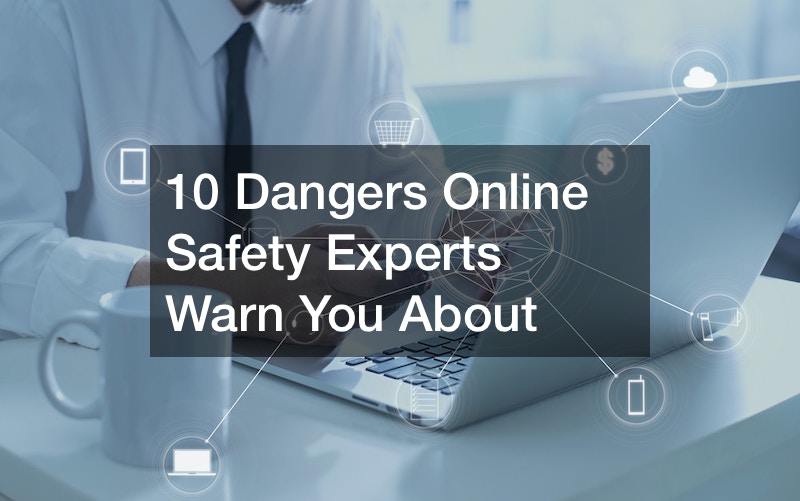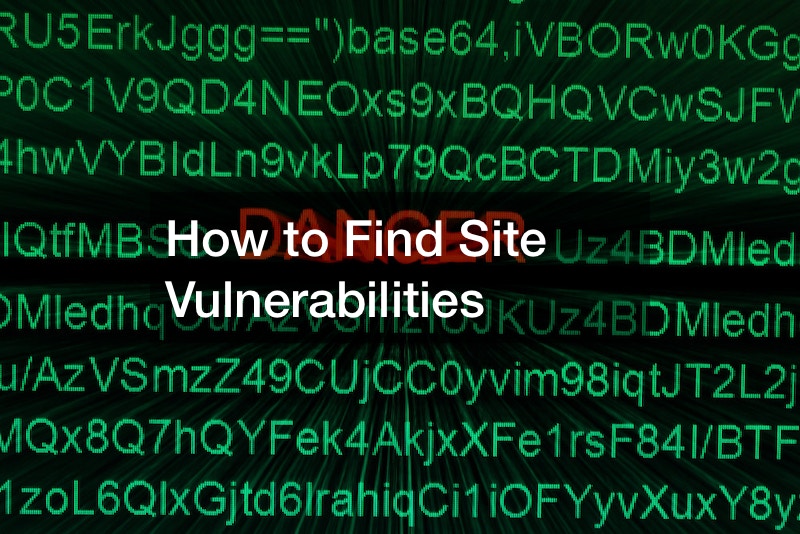
The internet is an ever-evolving entity that has come a long way since its public release. Whether you use the internet for work or if you have children in the home, turning to an online safety expert is a way to steer clear of potential dangers regardless of why you are online. With the help of an online safety expert, you can feel much more confident anytime you are browsing the web, whether you’re doing so to find information or even to make a purchase from the comfort of your own home.
1. Bad Advice

One of the first tips an online safety expert will offer when you’re searching for help with potential dangers online is to avoid bad advice. Whether you are preparing for an upcoming job interview or checking into a new gym to visit, it’s important to find resources and assistance that are verified and legitimate. Taking advice from a random website with little to no credibility can result in an outcome that you did not expect or that is not desirable. Anytime you are searching for advice in an area of life, you should do so from a website or an individual you can genuinely trust.
Risks of Taking Bad Advice Online
If you take bad advice online, regardless of what you are attempting to learn, you may end up making a purchase that is not worthy or taking actions in your own life that are not helpful or positive. This is why it is so important to discern where you are receiving your advice from, even when you choose to do so online. Always thinking critically and never allowing anyone to tell you something without first conducting your own research will minimize your risk of listening to and taking bad advice.
2. Faulty Equipment
Turning to an online safety expert is highly recommended if you’re new to shopping on the internet or if you are interested in making a significant purchase in the near future. Whether you’re currently in the market for a new car, a micro drill, or even a brand-new computer, you will want to ensure that any purchase you make does not include faulty equipment or materials that no longer work. When you are shopping online in order to make a big purchase, there are a few tips to keep in mind to ensure the process goes as smoothly as possible.
Tips for Shopping for Equipment Online
Shopping for equipment you need around the home or even for your workspace is much easier to do when you choose to shop from home, online. However, it’s imperative to conduct adequate research to find companies and providers that will offer equipment that is not only affordable, but also in proper working condition. Always take the time to read reviews and testimonials before choosing a retail storefront or manufacturer to purchase the equipment you’re interested in for the next project around your home or place of work.
3. People Misrepresenting Themselves
People misrepresenting themselves is one of the biggest issues with the internet today, warns many online safety expert professionals. From lying about a recent divorce or being married when attempting to connect with someone new, there are many different ways in which individuals misrepresent themselves today whenever they are online. Anytime you are thinking of meeting new people or getting to know someone new, it’s imperative to ensure they are in fact, real and authentic, especially if you begin sharing personal information or if you have any plans to meet up in person in the near future.
4. People Lying About Credentials

Another major concern that many online safety expert professionals have today is that individuals are lying about their personal and professional credentials at an alarming rate. Whether you are interested in hiring a professional life coach or if you’re searching for local dental practices near you in your community, it can be difficult to discern who is legitimate and authentic and who is lying without conducting a bit of research on your own. Anytime you are thinking of hiring someone new or visiting a new place of business, you will want to take a bit of time to research the credentials of the location and the reputation of individuals or companies you are interested in near you.
How to Verify Credentials
Unfortunately, verifying the credentials of an individual or company online is not always easy or straightforward. However, in some cases, you may have the ability to utilize websites such as the BBB if you want to learn more about a business in the US that is currently in operation. You can also research individuals with the use of social media, LinkedIn, and third-party sites or search engines to learn more about someone before placing your trust in them, whether you’re interested in working with them in a professional capacity or if you want to make a purchase from them directly online or via their own online storefront.
5. Fake Lawyers
For any online safety expert today, the importance of knowing how to find reputable service providers is essential and imperative at any age. If you are in need of retaining a securities attorney or if you’re looking to retain an entire criminal law firm, it’s important to do so only by working with legal professionals you can trust and rely on. Unfortunately, today, there are many different scams that often involve fake lawyers, which can lead to a costly mistake if you are unable to conduct due diligence before choosing a professional to hire for your own needs.
6. Misleading Information
The internet is packed with exciting and useful information that has changed the world. However, if you’re interested in learning more about complex topics, such as hormone replacement, politics, or even the Constitution, you will need to know where to turn in order to prevent consuming misleading information. Maintaining your ability to critically think on your own and your ability to research third-party websites to verify facts, statistics, and evidence is essential, especially when you are interested in learning more or gathering information about a particularly important or sensitive topic.
7. Viruses

When you turn to an online safety expert to learn more about staying safe online, one of the first elements you will be made aware of includes viruses. While viruses are not as popular or vast as they once were before new operating systems were released in the 2000s, they still play a major role in collecting data and causing employment issues among those who download them or open files with viruses in them on any type of computer. Knowing how to go about preventing a virus from being entered into your own computer is imperative to minimize the risks you are taking each and every time you are online and browsing the internet.
Risks of Computer Viruses
If you are unlucky enough to download and/or open a file that contains a virus on your computer, you are running the risk of causing serious or even permanent damage to your computer’s file system and in some cases, even to your own hard drive. Depending on the type of virus you have, you may also be sending private information or details used to log in to your banks, social media accounts, and even to your email account online. Viruses can wreak havoc on the computer and personal lives, which is why it is imperative to take the appropriate steps to avoid them and mitigate potential risks as much as possible anytime you are browsing the internet.
Tips to Avoid Viruses
Whenever you are online, visit websites you can trust and rely on. Avoid visiting websites that are unfamiliar to you or that appear sketchy when attempting to type the URL. Do not open any files from individuals or companies unless you know them personally and are expecting a particular file, even if the file is sent via email.
Anytime you choose to download a file from a website or even from another recipient you know, it is still wise to use your antivirus program. Scan any file you download before opening it for optimal protection. Research companies, individuals, and individual email addresses if you receive strange emails or messages from them to determine if they are attempting to scam you or send you a virus.
8. Scam Emails
Scam emails are some of the oldest types of scams in the book, warns an online safety expert. Whether you receive an email from your bank or even a local florist near you, it is imperative to know how to distinguish authentic emails from those that are rife with scam and phishing links meant to steal and scrape your own personal information. Unfortunately, it is not always easy or straightforward to identify scam emails, especially if they appear legitimate and nothing is alarming about their format, design, or language.
Tips to Avoid Clicking Links in Scam Emails
Just about anyone may become a target of a scam email at one point or another in their lives, especially if you use your email on hundreds of websites and social media platforms across the web. Whenever you receive a new email, it is important for you to take the time to research the email address, IP address, and potential links that are included in the email before accepting it as authentic and legitimate. Before clicking a link that is included in an email that you are unsure if you can trust, be sure to hover over the link to determine where the URL is pointed to before opening it. This will ensure you do not click a link that goes to an unfamiliar website address or one that is designed to collect and steal information from users.
9. False Employment Opportunities
When you turn to an online safety expert to learn more about protecting yourself when you’re on the internet, it’s important to avoid false employment scams. From promoting local movers positions to full-time work-from-home jobs, there are many different employment scams that can be discovered on traditional job site boards, third-party search engines, and even throughout numerous social media groups and communities that are popular and thriving today. Whether you’re looking for a job for someone you know or if you are seeking employment for yourself, knowing how to verify a job listing or ad can go a long way in preventing you from being scammed.
How to Discern Fake Employment Ads
When you begin comparing employment listings, it’s important to take into consideration where you are searching for work and who is posting the ad. Conduct research on each company promoted and visit the official website of the business to confirm that they are, in fact, actually hiring at the time you are looking. You should also be sure to review potential external links that are included in an employment ad, as these links may not directly connect to the official website of the employer, but to a scam website. Search for the company that is currently hiring using a third-party search engine such as Google, Yahoo!, or Bing to determine if there is any other news recently shared about online scams involving the business or brand.
10. Financial Scams

An online safety expert understands the rise of financial scams, whether they appear in an email or on social media. Whether you are working for payroll companies or if you own your own business, you will need to familiarize yourself with potential financial scams you may encounter anytime you are conducting business online and with the use of different websites or platforms. Financial scams can range from stealing credit card information to sending phishing links via email or even with the use of a social media page or messenger.
When it comes to protecting yourself anytime you’re online, you can do so by turning to an online safety expert that you can trust and rely on. The more familiar you are with current trends, scams, and fake listings online, the easier it will be for you to discern what is legitimate and who is attempting to scam others. Keeping up with scams and the latest dangers online will allow you to still maintain access to the internet without feeling as if you are being taken advantage of every time you visit a website.



